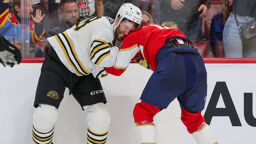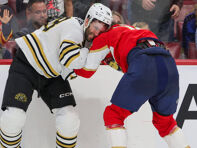Blame Russia! That has been the mantra from at least two NHL teams who screwed up their Pride nights by not having their players wearing Pride warmups as promised. But one top NHL official says there’s no evidence that Russia cares about Pride nights.
“We take all risks seriously, and this one is no different,” NHL deputy commissioner Bill Daly wrote in an email to The Athletic. “Having said that, we have no information that would suggest there is any material threat that would exist [in Russia or otherwise] related to a Russian player participating in a club’s Pride activities.”
In recent weeks, the Chicago Blackhawks and Minnesota Wild canceled plans for their teams to wear Pride warmup jersey, blaming anti-gay laws that have been passed in recent years for putting Russian players on their teams at risk. Daly’s statement puts those cancellations in a new light. I think more and more this is a case of using the Russian laws as shields for players who don’t want to wear a Pride jersey but also don’t want to have to defend their decision publicly.
What’s notable is that there have been at least six Russian players who wore Pride warmups this year (so much for the fear factor), most recently Thursday, the latter fact noted by Scott Stinson of the National Post:
Why the NHL, which has largely avoided acknowledging that the Russian invasion of Ukraine is a thing that is happening, is worried about the impact of a law passed in Moscow, is hard to figure. It doesn’t take much research to discover that punishment for violating the law is just a fine, that enforcement is rare, and that there was never any indication that Russia was going to try to apply it beyond its own borders. Do Russian NHL players honestly think that someone back home is going to come after them for wearing a small rainbow patch on their jersey for 20 minutes while they do a few laps around the ice with their teammates?
Even as the Staals refused the Pride jersey on Thursday, their Russian teammate Sergei Bobrovsky wore one. Perhaps he is aware that Russia has other concerns on its mind these days.
Despite the Blackhawks agreeing with Daly’s assessment of the situation, they still defended not wearing Pride warmups, telling the Athletic:
“We are unaware of any direct, material threat on an individual currently. That being said, we understand that there is a more general threat toward certain players and believe we need to respond accordingly. We will not have any further comment on this matter at this time. We wish to reiterate that our overall Pride night will go on as planned, and we are excited for all of the activities and LGBTQIA+ community members who will be in the spotlight.”
That statement is an excuse more than an explanation. They know of no threat to any player and yet cited having three Russian players on their teams for the reason to ban the Pride warmups this year. That’s messed-up logic.
With at least four players — Eric Staal, Marc Staal, Ivan Provorov and James Reimer — citing religious beliefs for not wearing Pride warmups, along with the preemptive actions by the Wild, Blackhawks and the New York Rangers of banning the warmups, we have six teams this season whose Pride nights became marred by homophobia and put a lie to the “Hockey is for everyone” tune the league has been singing the past few years.
Despite how crappy it is that a simple gesture of wearing a Pride jersey — totally noncontroversial in past years — has been warped by politics and religion, let’s not lose sight of the fact that almost all players on teams with such warmups donned them. I’ll leave the last word to Matthew Tkachuk of the Florida Panthers:
“For myself personally, obviously being out there and wearing the jerseys, and kind of enjoying and embracing a night like tonight — we only have so many of these nights throughout the season, whether it’s ‘Military Night’ or ‘Hockey Fights Cancer Night,’ or whatever,” the All-Star right wing said. “A night like night, for me, is really about including everybody. In my opinion, it’s by far the greatest game in the world, and everyone’s invited in my locker room and our locker room as an organization.”







































